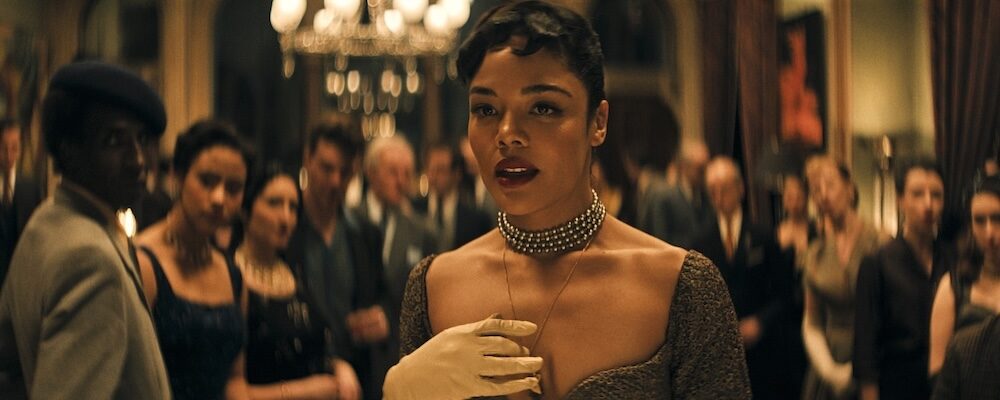‘Hedda’: Tessa Thompson Shines Darkly in Nia DaCosta’s Stylized Reinvention of Henrik Ibsen Classic
Tony Sokol
Social events celebrate barely covert warfare in “Hedda,” writer-director Nia DaCosta’s compelling adaptation of Henrik Ibsen’s classic 1891 play, “Hedda Gabler.” Tessa Thompson brings confident stagecraft to the screen to almost capture one of the great anti-heroines of theater. But her Hedda will not be caught, even if already trapped in a marriage of “safe choices” to the decreasingly wealthy academic George Tesman (Tom Bateman).
A former free spirit, the newly wed Hedda Tesman chose status over love, marrying for luxury, but her new husband’s mansion is so impossibly mortgaged it is a wonder the evening’s planned decadent amusement isn’t a rent party. It is something similar, but sinister, a trap for Hedda to charm George’s boss, Professor Greenwood (Finbar Lynch), and his wife Tabitha (Mirren Mack), and securing a lucrative professorship position at the university.
Transformations and transplantations abound. “Hedda” is set in the English countryside, rather than Ibsen’s Norway, and modernized to the 1950s. Eilert Lövborg, the outcast, alcoholic scholar Hedda rebuffs in the play, is renamed Eileen Lovborg (Nina Hoss), who is now Hedda’s ex-lover, and only three months sober. The manuscript Eileen brings to the party was co-written with her new paramour: Thea Clifton (Imogen Poots), who arrived before Eileen, very worried about all to come, and not one to be called a “muse.” Hoss gives an honest performance, very close to broken, stronger when breaking. Poots is vulnerable, with flickering social trauma mingling with dwindling hope. The manuscript is an opus about the future of sexuality. Appearances, be damned, it would seem.
After a bawdy retelling of a sexual advance coming in the form of a desperate invitation “smell my feet,” Eileen asks a roomful of male academic peers: “As some past hidden things have become normalized, I wonder why shouldn’t hidden things in the now become normal in the future?” Though she predicts the coming normalization of current deviancy, Eileen still wants good reviews. “So, I put nothing remotely controversial in the book,” she explains. This way its follow-up will be “protected from ridicule.”
From the outset, it appears Hedda is dead set on corrupting Eileen, trying to get a rise in order to undermine all the work Thea did to sober her up. Elegantly leading a lamb to slaughter. Hedda is infatuated with chaos. It not only creates opportunities to climb the social divide, but it personally amuses her. Even when Hedda directs the music on the bandstand, it is never too loud to drown out the gossip on the dancefloor. Or the noisy pistols. “Hedda” opens with a police interrogation, which telegraphs Act V into the consciousness too soon, rather than allow it to play out quietly.
Guns figure heavily in the prestige and lore of the late General Gabler. He left a set to his illegitimate daughter, Hedda, and several guns are fired during the course of the film. This is not where the violence occurs. Promises cause much deeper wounds, and secrets cut to the bone. Almost every sentence at the party is a thinly veiled shot across someone’s raised eyebrow. But no weapon is as deadly as a drink, offered as a two-pronged challenge.
Thompson internalizes the aristocrat posture, and an inscrutably pursed, stiff upper lip. Racial prejudice is explicitly referenced once, in an employment situation. Hedda also faces oppressions of class, gender, as well as sexual expression and gratification. With Eileen, Hedda was free of men. There are many references to Hedda’s sexually active past, and the lingering actions of the present. Although she shoots toward him upon arrival, Hedda also appears to be in a sexual relationship with Judge Roland Brack (Nicholas Pinnock). Through all the sensuality present in the relationships, and the manipulations, Thompson buries Hannah in sheets of Nordic ice and detachment.
Cinematographer Sean Bobbitt uses DaCosta’s quirky framing to set isolation among busy party scenes, reference relevant stage productions, and commit lascivious acts of subversive intimacy. The effect is stylized, and never stage bound, even though all action is set at one party, lavish and decadent as it wants to be. A particular highlight is Eileen’s entrance, which is captured through a double dolly shot, and seen through Hedda’s magnetic gaze. Production designer Cara Brower grandly presents a forgotten mansion of a decaying time patched up with art deco and exquisite coverings to resemble old wealth for new times. The garden maze conceals many games, and the chandelier is very responsive to jealous rage.
Composer Hildur Guðnadóttir’s percussive score propels the varied rhythms of the evening, mixing suspense and exultation, repression, and abandon. The repetitive gasps, reminiscent of “Yellowjackets,” conduct the emotional focus. The modernization of the anachronistic live music feels catered.
“Hedda” is imaginative and ambitious, but murky. DaCosta’s social distortion stops short of the clarity of reason in self-interest. Hedda’s rage is potent, her unpredictability is magnetic, and this comes through strongly. But it plays against shadows.
“Hedda” begins streaming Oct. 29 on Prime Video.

